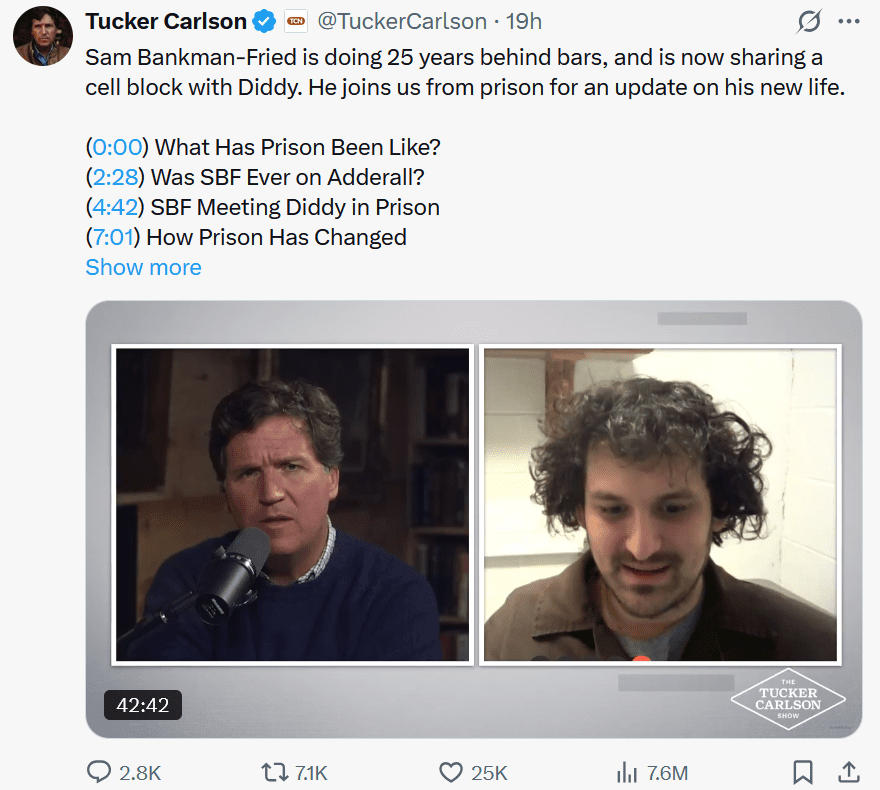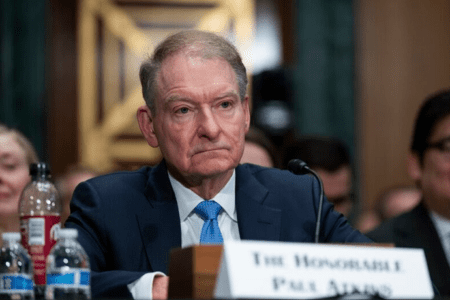In a remote interview with Tucker Carlson on March 5, 2025, Sam Bankman-Fried (SBF), the convicted FTX founder, reframed his $10 billion fraud as a mere liquidity crisis, denying criminal intent while playing chess with Sean ‘Diddy’ Combs in prison. As he hints at GOP leanings and a potential pardon, SBF’s narrative sparks debate: a bid for redemption or a refusal to face the fallout?
Summary of the Interview
Tucker Carlson conducted a remote interview with Sam Bankman-Fried (SBF) on March 5, 2025, from the Metropolitan Detention Center in Brooklyn, where SBF is serving a 25-year sentence. The interview, aired on Carlson’s platform on March 6, 2025 (SBF’s 33rd birthday), covered several topics:
- Prison Life: SBF described his daily routine, mentioning playing chess with other inmates, including Sean “Diddy” Combs, whom he called “kind” and a source of advice. He noted that blueberry muffins serve as a form of prison currency, reflecting an informal economy behind bars.
- FTX Collapse: SBF maintained that FTX’s downfall in November 2022 was not a bankruptcy in the traditional sense but a liquidity crisis exacerbated by a bank run and mismanagement. He claimed he tried to warn stakeholders but was ignored, asserting that FTX could have recovered with better handling by the bankruptcy team.
- Criminal Responsibility: SBF denied being a criminal, framing his actions as mistakes rather than intentional fraud. He argued that he operated in “good faith” under FTX’s terms of service and did not knowingly misuse customer funds, though he acknowledged the devastating impact on customers and colleagues.
- Political Views and Crypto Regulation: SBF hinted at a shift toward Republican leanings, criticizing “woke” culture and suggesting that crypto regulation should prioritize freedom and innovation over heavy-handed oversight. He did not explicitly ask for a pardon but expressed hope for a political resolution, possibly tied to his appeal or Trump’s administration.
- Personal Reflection: SBF expressed regret for the fallout, stating he thinks daily about those harmed by FTX’s collapse. However, he avoided admitting criminal intent, aligning with his not-guilty plea at trial.
The interview surprised many, including SBF’s crisis PR manager, Mark Botnick, who resigned on March 6, 2025, citing a lack of awareness about the arrangement.
Context: Why SBF Was Convicted
Sam Bankman-Fried founded FTX in 2019 and its affiliated hedge fund, Alameda Research, in 2017. Once hailed as a crypto prodigy with a net worth peaking at $26 billion, his empire unraveled in November 2022 after a CoinDesk report revealed Alameda’s heavy reliance on FTX’s native token, FTT, sparking a customer withdrawal frenzy. FTX couldn’t meet the demand, exposing an $8 billion shortfall in customer funds.
In December 2022, SBF was arrested in the Bahamas, extradited to the U.S., and charged with seven counts of fraud and conspiracy, including wire fraud, securities fraud, and money laundering. Prosecutors alleged he misappropriated $10 billion in customer funds, funneling them to Alameda for risky investments, political donations (over $100 million, split between Democrats and Republicans via “dark pool” contributions), and personal luxuries like Bahamas real estate. Three former colleagues—Caroline Ellison (Alameda CEO), Gary Wang (FTX co-founder), and Nishad Singh (FTX engineer)—pleaded guilty and testified against him, detailing how SBF directed them to siphon funds and conceal the scheme.
At his trial in November 2023, SBF pleaded not guilty, testifying that he acted in good faith and was unaware of the full extent of Alameda’s actions until shortly before the collapse. The jury rejected this defense, convicting him on all counts after just four hours of deliberation. On March 28, 2024, U.S. District Judge Lewis Kaplan sentenced him to 25 years, citing his lack of remorse and deliberate fraud. SBF has been detained since August 2023, with an appeal pending.
Summary of Discussion on X
Posts on X about the interview reflect a mix of intrigue, skepticism, and political speculation as of March 6-7, 2025:
- Prison Life: Users highlighted SBF’s anecdotes about chess with Diddy and muffin currency, with some finding it an odd glimpse into prison dynamics (@I_Can_Haz).
- FTX Narrative: Some posts echoed SBF’s liquidity-crisis claim, while others dismissed it as revisionism, pointing to his conviction (@WinghavenCrypto).
- Political Angle: X users speculated about SBF’s GOP hints and potential Trump pardon, with @johnmorganFL noting key takeaways and @BookemErin1 tying it to broader political critiques of Democrats. Another X contributor (@tom_carreras) meant: “SBF has been angling for this interview for years lol. He’s trying to create a narrative that he was politically persecuted.“
- Sentiment: Sentiment ranged from curiosity about SBF’s mindset (@GlobaltrekX linking the video) to cynicism about his denial of guilt, with little sympathy for his plight given the scale of the fraud.
The discussion suggests polarized views: some see SBF as a fallen figure seeking redemption, while others view the interview as a calculated PR move.
Interpretation
The interview appears to be a strategic effort by SBF to reshape his public image and bolster his appeal or pardon prospects. By emphasizing a liquidity crisis over fraud, he challenges the legal narrative, though this contradicts overwhelming trial evidence (e.g., testimony from Ellison, Wang, and Singh). His GOP leanings and critique of “woke” agendas—echoing a 2022 plan to appear on Carlson’s show to “come out as a Republican”—seem tailored to appeal to conservative audiences, possibly including Trump, whom Bloomberg reported SBF has eyed for a pardon. Carlson, a Trump ally, provides a sympathetic platform, amplifying SBF’s voice at a time when his legal team is limited in public statements.
SBF’s denial of criminality aligns with his trial stance but clashes with judicial findings. Judge Kaplan explicitly rejected his “no loss” claim, noting his lies under oath and lack of remorse. His prison anecdotes humanize him, perhaps to garner empathy, but risk trivializing the $10 billion fraud’s impact on victims, many of whom submitted harrowing statements about financial ruin and mental health crises.
The timing—amid an appeal and post-Trump’s 2024 election win—suggests political maneuvering. However, his crisis manager’s resignation indicates internal discord and public reaction to X leans skeptical, limiting the interview’s persuasive reach beyond Carlson’s base.
Conclusion
SBF’s interview with Carlson blends personal reflection, legal defensiveness, and political signaling. While he maintains innocence and frames FTX’s collapse as mismanagement rather than malice, his conviction rests on robust evidence of deliberate fraud. The X discussion underscores a divided reception, with his narrative gaining traction among some but failing to sway those aware of the trial’s details. His strategy may aim for a long-shot pardon or appeal victory, but it risks reinforcing perceptions of denial over accountability.






